译林高中英语模块七Unit1 语法复习导学案设计 (无答案)
译林高中英语模块七Unit1 词汇复习导学案设计(无答案)

M7U1 单元词汇复习学案一、知识梳理1.keep in touch with 与……保持联系lose touch with 失去联系be out of touch with 失去联系get in touch with 取得联系2.Keep/stay/be in touch with 与……保持联系e.g: With mobile phones, we can ____ ___ _____ ____ others wherever we are.(keep in touch with)e.g: It's not easy for us to __________________ each other, so we must ______________________from now on.我们好不容易联系上。
因此,从现在开始,我们必须保持联系。
(get in touch with)(keep in touch)e.g: Please leave your phone number in case we ______________you again.请留下电话,以防我们再次失去联络。
(lose touch with)e.g: we ______________________him for about ten years.我们大约10年没和他联系了。
(have been out of touch with)2. evolution n.① 进化Darwin's theory of evolution② 演变,发展the evolution of languageevolve from -----由……逐渐演变evolve into---逐渐发展成为……e.g: The company has _______ _____ a corporation. (evolved into)这个公司已经发展为一个大企业。
七年级英语译林版上册Unit7_Grammar1同步导学案
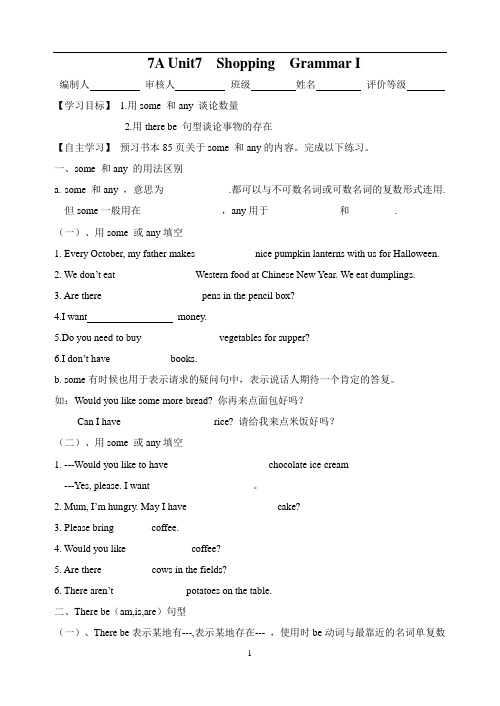
7A Unit7 Shopping Grammar I编制人审核人班级姓名评价等级【学习目标】 1.用some 和any 谈论数量2.用there be 句型谈论事物的存在【自主学习】预习书本85页关于some 和any的内容。
完成以下练习。
一、some 和any 的用法区别a. some 和any ,意思为_____________.都可以与不可数名词或可数名词的复数形式连用.但some一般用在________________,any用于______________和_________.(一)、用some 或any填空1. Every October, my father makes ___________ nice pumpkin lanterns with us for Halloween.2. We don’t eat _______________ Western food at Chinese New Year. We eat dumplings.3. Are there ___________________ pens in the pencil box?4.I want money.5.Do you need to buy _______________vegetables for supper?6.I don’t have ___________ books.b. some有时候也用于表示请求的疑问句中,表示说话人期待一个肯定的答复。
如:Would you like some more bread? 你再来点面包好吗?Can I have __________________rice? 请给我来点米饭好吗?(二)、用some 或any填空1. ---Would you like to have ___________________ chocolate ice cream---Yes, please. I want ____________________。
牛津译林版-英语-七上-7A 1单元 Grammar导学案

你家有几口人?
How many people _________ _________in your family?
三、句型转换。
1.We have four lessons.(否定句)
否定句:_________________________________________________
一般疑问句:_________________________________________________
划线提问_________________________________________________
_________________________________________________
4. I usually play football on Friday afternoon.
否定句:_________________________________________________
一般疑问句:_________________________________________________
_______you _________ playing _________ ___________?
在周末,他通常跑半小时的步。
_______ the weekend, he usually_________ running for _________ an hour.
我擅长英语,而且是英语兴趣小组的成员。
导 学 案
总6课时
上课时间
课 题
Unit1 Grammar导学案 牛津译林版七年级上册英语

7A This is me ! 导学案3 NO.26【学习内容】 Grammar【学习目标】1.学会be动词的一般现在时。
2.能使用be动词一般现在时的各种形式来谈论有关人或物的信息。
【学习重难点】重难点是理解动词to be的一般现在时的各种形式。
【温故知新】I.用所给词的适当形式填空。
1. They like _________ (play) basketball after school.2. We love ________ (read) comic books.3. They are good at __________(swim).4. Where ______ (be) Lucy and Lily?5. ★ My father_____(come)from Nanjing .( ) 1.Lucy likes _______ books, but Lily loves_______ TV.A. read; lookB. reading; lookingC. reading; watchingD. looking; reading( ) 2. The little girl has _______.A. long hairB. a long hairC. black hairs( ) 3. Jack is good ________ .A. in swimB. at swimmingC. of swimmingD. at swim【自主学习】Ⅰ、预习P12生词,快速拼读、记住下列生词并能默写穿过教室主人年级年级学生阅读II.熟读课本P11页内容和P12内容后完成下列填空1. 主语是“I”用_________,主语是“you ,we , they”和表示复数意义的词时,用 __________,主语是“it , he , she”以及相当于he, she,it的词时,用______。
2. 用be 动词填空。
模块七一单元设计导学案档

模块七设计导学案Read and finish the following tasksTask 1 T or F1 The Amish do not use phones2 The Amish oppose having telephones in that there are lots of disadvantages.3 The Amish generally are mentally healthier than most people .4The author thinks it no good using phones and he does itTask 2 [课课练] 上的练习Task 3 In the USA,the Amish—a Christian group—are famous because they drive carriages instead cars,do not use TVs and refrigerators,and do not have personal telephones.Many people assume the Amish must have religious reason for their many rules,but this is not truly.In the truth,whenever a new technology was introduced,the Amish meet and discuss its advantages and disadvantages.They then vote on that they will accept it.The Amish reject cars because they like having tight communities which everyone lives closely together.They have no TVs or refrigerators because their homes do not have electricity—they do not think it is necessary and dislike deal with strangers,such as the people who work at the electric company.考点1 vote v.投票,选举n. 选票;选举voter 投票人;选举人vote for/ in favour of /against…投票赞成/反对vote to do/that…投票去做vote on/upon 就…表决have/take a vote 选举你给她投了赞成票还是反对票?1> Did you vote _____or _______ her ??2>We ’ll list en to the arguments from both sides and then vote ___ it.2 reject vt. 拒绝,拒收;不予考虑,不予录用n. rejectionreject one’s help/offer/plan/application 拒绝接受某人的帮忙/提议/计划/申请refuse to do sth. 拒绝做某事decline an offer/invitation 婉言谢绝主动帮忙/邀请I __________ _________ ________(没有被录取) all the universities I applied to.Children feel abandoned or___________if they don't see their parents regularly.3 value1)The book is _____(value )2)They value ____(make ) real friends.3)The book is _____ great value4 oppose vt.反对;反抗;与(某人)较量(1)His daughter is very athletic as _____(oppose) to his son.(2)She is opposed ______ your marrying her.(3)He opposed________(build) a new hall.Summary5 For example,no matter what the circumstances,when the phone rings,everything stops so that the call can be answered.例如,无论在什么情况下,当电话铃声响起时,为了能接电话,一切都要停下来。
译林高中英语模块七Unit1 重点句型和作文练习学案 (无答案)

M7U1重点句型及作文练习学案一、重点句型复习1.(P2)They also make TV accessible to people who live far away from cities, and satellite dishes can often be seendistributed throughout the countryside and remote areas.它们也使远离城市的人们可以收看电视,在农村和边远地区经常可以看到分散的卫星天线。
make TV accessible 是“make+宾语+宾补”结构,宾补由形容词充当。
“make+宾语+宾补”结构的常见形式:①make+宾语+名词/形容词/介词短语/过去分词/不带to的不定式①make+it+adj./n.(+for sb/sth)+带to的不定式“感官动词+宾语+宾补”用法常见的感官动词或短语:see, look at, listen to, hear, smell, observe, find, watch, notice等宾语:名词或代词宾补的常见形式:现在分词(强调动作正在进行)不带to的不定式(强调动作的全过程,宾补变为主补时,to要加上)过去分词(可表示被动和动作已经完成)【即时巩固】根据所给汉语,完成句子1)I a book when I passed by. 我经过时,看到他正在看书。
2)He is very popular among his students as he always tries to make them_____in his lectures.A.i nterested B.interesting C.interest D.to interest2.(P9)I was at the dentist’s last Sunday to have my teeth checked.我上周日在牙医诊所检查我的牙齿。
牛津译林版英语选修七 Unit1导学案
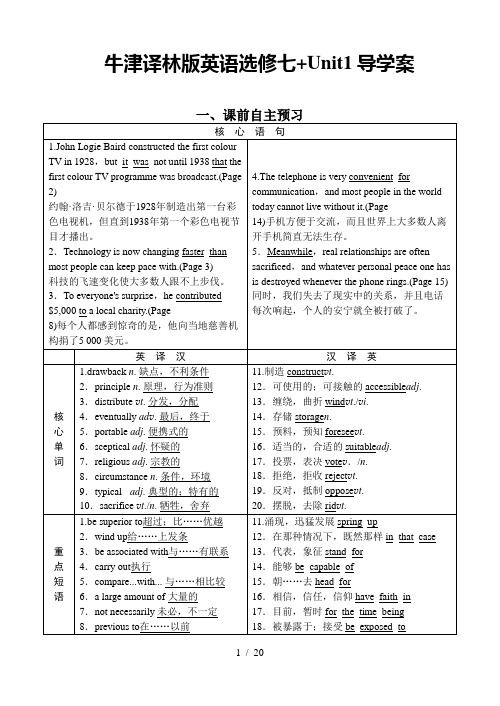
温故知新
A.馨然过关B.基本通过C.再努力
二、课内合作探究
Ⅰ.根据汉语提示,写出单词的正确形式
1.He looked like a (典型的)tourist.
2.The Management Union (拒绝)the worker's demand.
同时,我们失去了现实中的关系,并且电话每次响起,个人的安宁就全被打破了。
英 译 汉
汉 译 英
核
心
单
词
1.drawbackn.缺点,不利条件
2.principlen.原理,行为准则
3.distributevt.分发,分配
4.eventuallyadv.最后,终于
5.portableadj.便携式的
6.scepticaladj.怀疑的
8.The ship set sail and London.
9.The amount of radiation using a mobile phone for two half-hour periods per day.
10.Because of MP3 players,music websites have all over the Internet.
3.He is reading a book about the (适应)of desert species to the hot conditions.
4.The villagers (反对)building a plant on their farmland.
5.The money was (分配)among schools in the area.
译林牛津模块7Unit1复习材料(短语和句子)(译林牛津版高二英语选修七教案教学设计)
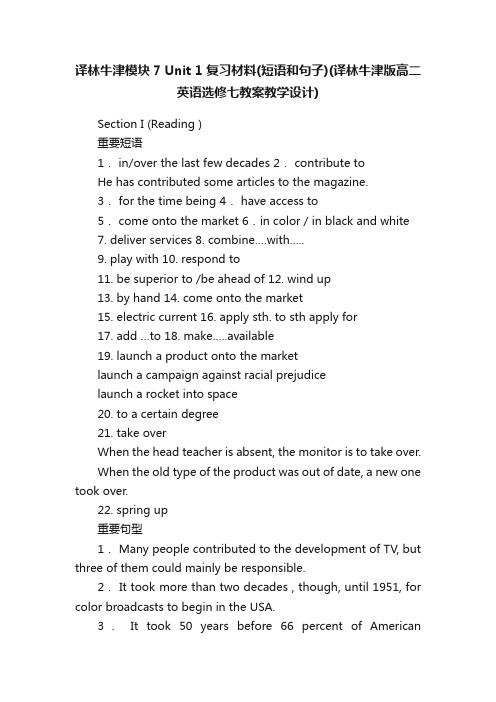
译林牛津模块7 Unit 1 复习材料(短语和句子)(译林牛津版高二英语选修七教案教学设计)Section I (Reading )重要短语1. in/over the last few decades 2. contribute toHe has contributed some articles to the magazine.3. for the time being 4. have access to5. come onto the market 6.in color / in black and white7. deliver services 8. combine….with…..9. play with 10. respond to11. be superior to /be ahead of 12. wind up13. by hand 14. come onto the market15. electric current 16. apply sth. to sth apply for17. add …to 18. make…..available19. launch a product onto the marketlaunch a campaign against racial prejudicelaunch a rocket into space20. to a certain degree21. take overWhen the head teacher is absent, the monitor is to take over.When the old type of the product was out of date, a new one took over.22. spring up重要句型1. Many people contributed to the development of TV, but three of them could mainly be responsible.2. It took more than two decades , though, until 1951, for color broadcasts to begin in the USA.3.It took 50 years before 66 percent of Americanhouseholds had it4. Some consider digital TV to be superior to satellite TV because it allows the same services to be delivered with clearer pictures than before.5. Consumers in the USA had access to 200 channels.6. With interactive TV programming , you can play along with game shows , respond to questionnaires and chat to other viewers. (连动句)7. At that time , the record player had to be wound up by hand.8. 1931 was the year when a German company began to make the first tape recorders, which could record and play sounds on a tape wound around a round object.9. They bought the patent and applied the technology to create the transistor radio.10.In 1982, the first CDs produced by using digital technology were made available.11. The popularity of MP3 has increased to such a degree that major corporations are taking over the portable music player market.12.Music website has sprung up all over the Internet offering MP3 music for people to purchase.Section II (word power, grammar and usage, task)重要短语1. accompany sb. to do2. look into3. head for4. in time for/ in time to do5. by means of6. by accident/mistake7. for/on sale8. keep ….in mind9. in order ofThe company brought in $40000 in the first quarter of the year.Don’t bring in unnecessary information when composing an article.The hospital has brought in many experts in cancer and new pieces of equipment.重要句型1. Could you accompany me to get a new one while the sale is on?2. They have an ample selection and seem to introduce new models all the time3. The price is likely to go down.4. It is up to you to decide whether it is in your budget or not.5. It doesn’t matter so much whether/if h e is coming or not.6. It is shaped like a penSection IIII (Project)重要短语1. provide sb. with sth/provide sth. for sb.2. be based on/ base sth. on3. concentrate (one’s attention) onfocus….on/fix….on(upon)/ center…..on(upon)4. not necessarily5. be equal to6. conduct a study7. be exposed to重要句型1. Using a mobile phone doubles the risk of developing braincancer, a disease which is terminal.2. The report is based on the findings of research carried out in Sweden , comparing 1617 patients found to have brain tumours with the same number of healthy people.3. People who used mobile phones were two and a half times more likely to have a brain tumour on the side of the head where they held their phones than people did not use them.4. Half of the mice were exposed to radiation while the other half did not receive any radiation.5. The first half had more than twice the cancer rate of the second half.6. Previous to this, scientific experiments did not show a definite link between mobile phone use and cancer.7. The amount of profit involved is enormous.8. It is possible to draw a parallel between mobile phones and cigarettes.。
译林高中英语模块七Unit1重点句型和作文练习学案(无答案)
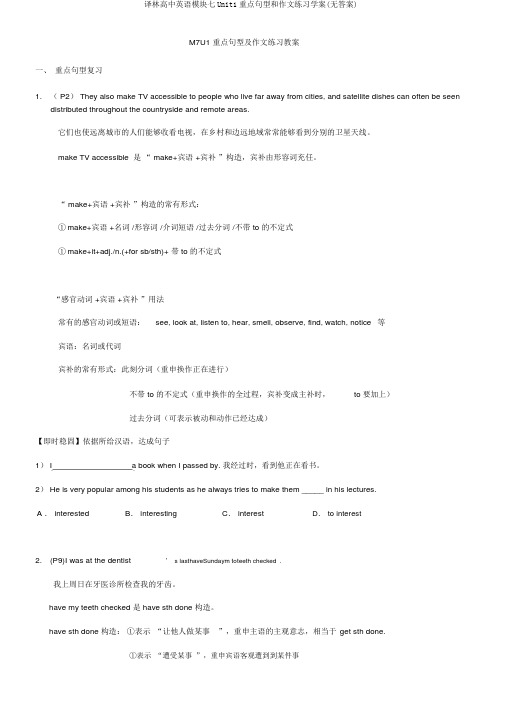
M7U1 重点句型及作文练习教案一、重点句型复习1. ( P2) They also make TV accessible to people who live far away from cities, and satellite dishes can often be seendistributed throughout the countryside and remote areas.它们也使远离城市的人们能够收看电视,在乡村和边远地域常常能够看到分别的卫星天线。
make TV accessible 是“ make+宾语 +宾补”构造,宾补由形容词充任。
“ make+宾语 +宾补”构造的常有形式:①make+宾语 +名词 /形容词 /介词短语 /过去分词 /不带 to 的不定式①make+it+adj./n.(+for sb/sth)+ 带 to 的不定式“感官动词 +宾语 +宾补”用法常有的感官动词或短语:see, look at, listen to, hear, smell, observe, find, watch, notice等宾语:名词或代词宾补的常有形式:此刻分词(重申换作正在进行)不带 to 的不定式(重申换作的全过程,宾补变成主补时,to 要加上)过去分词(可表示被动和动作已经达成)【即时稳固】依据所给汉语,达成句子1) I a book when I passed by. 我经过时,看到他正在看书。
2) He is very popular among his students as he always tries to make them _____ in his lectures.A . interested B. interesting C. interest D. to interest2. (P9)I was at the dentist’ s lasthaveSundaym toteeth checked .我上周日在牙医诊所检查我的牙齿。
英语译林牛津选修7Unit1精品学案1Welcome--01
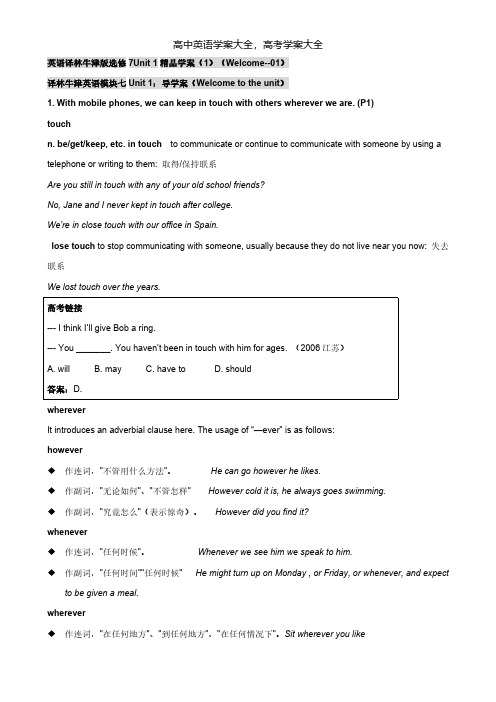
英语译林牛津版选修7Unit 1精品学案(1)(Welcome--01)译林牛津英语模块七Unit 1:导学案(Welcome to the unit)1. With mobile phones, we can keep in touch with others wherever we are. (P1)touchn. be/get/keep, etc. in touch to communicate or continue to communicate with someone by using a telephone or writing to them: 取得/保持联系Are you still in touch with any of your old school friends?No, Jane and I never kept in touch after college.We're in close touch with our office in Spain.lose touch to stop communicating with someone, usually because they do not live near you now:失去联系We lost touch over the years.高考链接--- I think I’ll give Bob a ring.--- You _______. You haven’t been in touch with him for ages. (2006江苏)A. willB. mayC. have toD. should答案:D.whereverIt introduces an adverbial clause here. The usage of “—ever” is as follows:however◆作连词,"不管用什么方法"。
译林牛津模块7Unit1教学案(译林牛津版高二英语选修七教案教学设计)
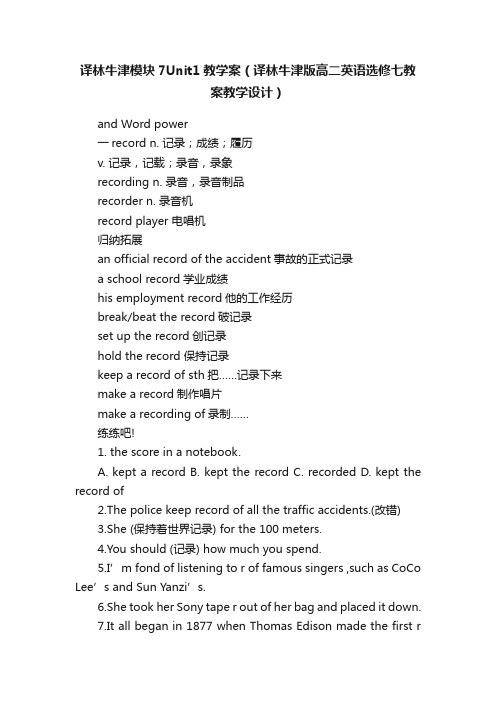
译林牛津模块7Unit1教学案(译林牛津版高二英语选修七教案教学设计)and Word power一record n. 记录;成绩;履历v. 记录,记载;录音,录象recording n. 录音,录音制品recorder n. 录音机record player 电唱机归纳拓展an official record of the accident事故的正式记录a school record学业成绩his employment record他的工作经历break/beat the record破记录set up the record创记录hold the record 保持记录keep a record of sth把……记录下来make a record制作唱片make a recording of录制……练练吧!1. the score in a notebook.A. kept a recordB. kept the recordC. recordedD. kept the record of2.The police keep record of all the traffic accidents.(改错)3.She (保持着世界记录) for the 100 meters.4.You should (记录) how much you spend.5.I’m fond of listening to r of famous singers ,such as CoCo Lee’s and Sun Yanzi’s.6.She took her Sony tape r out of her bag and placed it down.7.It all began in 1877 when Thomas Edison made the first rof a human voice.二. contribute to 捐献……贡献……给……有助于对……起作用练练吧!1.所有的孩子把空余时间花听音乐会上了.2.充足的新鲜空气有助于健康.3.他的粗心大意是造成事故的原因.三.It is certai n/uncertain that … ……(不)确定(certain/uncertain 不能用sure/unsure替换)be uncertain about/of… 对……没把握in no uncertain terms 明确有力地uncertainly adv.拿不准地 uncertainty n. 忧郁; 拿不准的事练练吧!1. 我们俩都不确定该怎么办.2. I told him what I thought of him (直言不讳地).3. I’m (不确定他会不会赢) in the round.4. It’s what his role in the company will be, and he is a bit anxious about it at moment. A. certain B. uncertain C. sure D. unsure5. They smiled at one another.A. uncertainB. uncertaintyC. uncertainlyD. in uncertain terms四. be superior to …超过… … ; 比… … 优越be inferior to…劣于… …练练吧!1.这家公司比我三年前工作地那公司好.2.我认为,手工做的裤子比机器做的好.3.They are superior us numbers.A. to ; inB. over ; toC. to ; byD. over ; by4. He is my superior in knowledge .He in knowledge.五. come onto the market上市;面练练吧!1.这所房子是昨天才投放到市场出售的.2. 在一个新产品上市前有许多事情要做.六. wind ( wound wound )vt.上发条;缠;绕wind up 给……上发条;使某人高度兴奋wind down (钟表)慢下来,停住; (人)松弛下来练练吧!1.你的表上发条了吗?2.这条河蜿蜒流向大海.3. This year has been too busy for me; I need a holiday .A. winding upB. to wind upC. winding downD. to wind down4. The wind is too strong; please wind the window .A. downB. inC. upD. back七.apply vi &vt 应用, 运用; 申请归纳拓展apply for sth to sb向某人申请某物apply to (sb /sth )(与某人/某物)有关; 有效; 适用于……apply oneself to (doing) sth集中精力做某事练练吧!1.你应该立即申请,亲自去也好,写信也好.2.这项新技术很快就用在了实践中.3.我将去那家公司申请那项工作.4.考试前每个学生都在集中精力学习.5.这件事与你无关.八.demand v.& n. 需要,需求, 要求归纳拓展by popular demands由于许多人的要求,由于普遍要求in demand需求量大,有需求meet /satisfy one’s demands /needs满足某人的需求make demands on sb对某人提出要求on demand 一经要求demand sth要求, 需求……demand to do sth要求做……demand that 从句( 谓语为should+动词原形, should 可省略) 要求……练练吧!1.The key to the problem is to the demands by the customers.A. solve; meet ; madeB. solving ; meet ; madeC. solve ; met ; makeD. solving ; meeting ; made2.It is demanded that the play for another week.A. runsB. will runC. runD. shall run3.Good workers are always demand in the factory.A. inB. onC. byD. for4.The workers demanded immediately.A. being repliedB. replyingC. to be repliedD. to reply九.spring vi. (sprang sprung ) 跳,跳跃,弹起归纳拓展spring to life突然活跃起来spring back弹回到原来的位置spring sth on sb向某人突然说出某事spring up突然出现,涌现,迅猛发展练练吧!1.Doubts have began to spring in my mind.A. backB. onC. upD. down2.I have to spring this you at such short notice.A. backB. onC. upD. down3.全镇各地很快盖起了新房子.十. assume vt. 假设,设想,以为 .assumed adj. 假设的,假定的assume that 从句认为……, 假定……练练吧!1.I hope to go to college next year, always that I pass my exams.A. assumeB. to assumeC. assumingD. assumed2. (普遍认为) stress is caused by too much work.3认为经济将继续好转是有道理的.Key :一.1.C 2.keep 后加 a 3. holds the world record 4. record /keepa record of二. 1.All the children contributed their free time to the concert.2. Plenty of fresh air contributes to good health.3.His carelessness contributed to the accident.三. 1.We’re both uncertain about what to do. 2.in no uncertain terms 3. uncertain of his winning / uncertain whether he will win 4.B 5. C四.1. This company is superior to the one I worked at three years ago.2. In my opinion, trousers made by hand are superior to those by machines3. A.4. is superior to me五. 1. This house only came onto the market yesterday.2.Many things need to be done before a new product comes onto the market.六.1. Have you wound your watch?2. The river winds down to the sea.3. D4. C七. 1. You should apply immediately, in person or in letter.2. The new technology was soon applied in practice.3.I will apply to the company for the work.4.Every student applies themselves to studying before the exams.5.This case does not apply to you.八. 1. B 2. C 3. A 4. D九1.C 2 .B 3.New houses were springing up all over the town.十.1.C. 2.It is generally assumed that3.It is reasonable to assume that the economy will continue to improve.Grammar备课人:万华1 familiar adj.be familiar with ------ 对 ------ 熟悉be familiar to ----- 为------熟悉Complete the following sentences:我对这个城市很熟悉。
译林版七年级英语上册 Unit 1 This is me Welcom to the unit导学案(无答案)
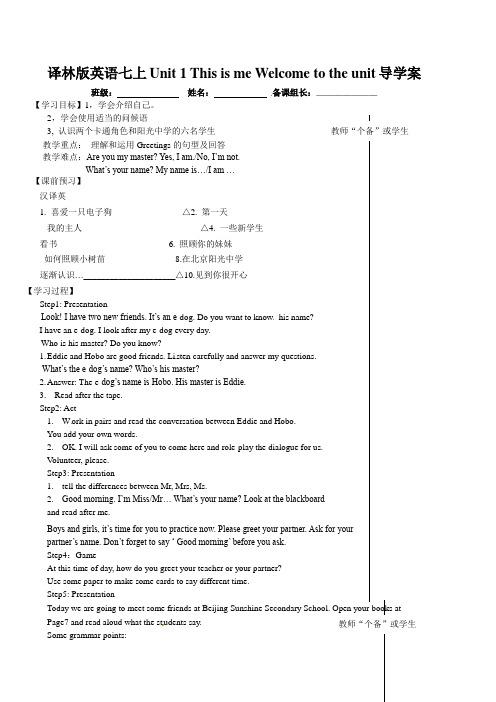
译林版英语七上Unit 1 This is me Welcome to the unit导学案班级:姓名:备课组长:______________【学习目标】1,学会介绍自己。
2,学会使用适当的问候语Array 3, 认识两个卡通角色和阳光中学的六名学生教学重点:理解和运用Greetings的句型及回答教学难点:Are you my master? Yes, I am./No, I’m not.What’s your name? My name is…/I am …【课前预习】汉译英1. 喜爱一只电子狗________________△2. 第一天____________________我的主人___________________________△4. 一些新学生看书_________________________ 6. 照顾你的妹妹如何照顾小树苗________________8.在北京阳光中学逐渐认识…_____________________△10.见到你很开心【学习过程】Step1: PresentationLook! I have two new friends. It’s an e-dog. Do you want to know his name?I have an e-dog. I look after my e-dog every day.Who is his master? Do you know?1.Eddie and Hobo are good friends. Li sten carefully and answer my questions.What’s the e-dog’s name? Who’s his master?2.Answer: The e-dog’s name is Hobo. His master is Eddie.3.Read after the tape.Step2: Act1.W ork in pairs and read the conversation between Eddie and Hobo.You add your own words.2.V olunteer, please.Step3: Presentation1.tell the differences between Mr, Mrs, Ms.2.and read after me.partner’s name. Don’t forget to say ‘ Good morning’ before you ask.Step4:GameAt this time of day, how do you greet your teacher or your partner?Use some paper to make some cards to say different time.Step5: PresentationPage7 and read aloud what the st udents say.Some grammar points:1. introduce 介绍introduce A to B2. introduce her to him把她介绍给他3. introduce myself to them 我向他们作自我介绍4. introduce themselves to each other 他们彼此作介绍5. This is their the first lesson (X)6. This is me.7. Who’s it?(不知性别时用it)8. Who’s the cat’s m?(主人)We’re m of the country.9. meet new friends 遇见/会见10. I don’t know how to look after my e-dog.He doesn’t know where to go.They don’t know what (do).He knows when (start出发).They don’t know which book (buy).疑问词+to do(疑问词后的动词填空→to do)eg: Can you tell me how (answer) the questions?11. What does Lucy to you?A.speakB.talkC.sayD.tellspeak to sb talk to / with sbsay to sb(强调说话的内容) tell to sb(X)eg: He “Don’t do that”.△12. -Is your name …? -Yes, it is.【当堂训练】选择( ) 1. Good morning ________ you. A. with B. to C. for D. at( ) 2. Kate, ______ the dog, please.A. see B. look at C. Read D. talk( ) 3 I have ____ brothers or sisters. I’m the only child in my family.A. notB. noC. don’tD. doesn’t( )4. After ______“Goodbye”, he left(离开).A. speakingB. talkingC. sayingD. telling( ) 5. --______. What’s the time ? --______, I don’t knowA. Sorry, SorryB. Excuse me. Excuse meC. Sorry, Excuse meD. Excuse me, Sorry ( ) 6.He was born _____ Shanghai _____ 1990.教师“个备”或学生笔记栏A. in, inB. at, in C, in, at D. at, at( ) 7. I want to know how ______ English well.A. learnB. learningC. learnsD. to learn( )8. –Where ___ my glasses ?—I can’t find ________.A. is, itB. are, themC. is, theyD. are, they( )9.There isn’t _____ water in the bottle. Give me ____, please.A. any, someB. some, anyC. some, someD. any, any( )10. Everyone _____ the lovely baby.A. lovesB. loveC. to loveD. loving△( )11.Eddie has ______ e-dog, and ______ e-dog is very good.A. an; anB. the; anC. a; theD. an; the△( )12. –What’s her name? -___________A. It’s SimonB. Her is MaryC. She’s MaryD. His name is Sandy【课后提升】一:改错1. I often have a supper with my family. __________2. Does she get up early everyday? _____________3. I have a dog. It’s name is Eddie. ___________4. I’m not good to sports. ____________5. My cousin with his friends love playing footb all. ___________6. This is my the first day in this new school. ______________7. What do you often say your father? _____________8. Boys and girls, welcome my class. _____________二:首字母填空1. Tom is p_________ and helpful.2. The children often s________ in the river.3. Don’t t________.! Listen to me carefully.4. Li Hua likes r__________ books.△5. The old man is the bird’s m________________. It is his bird.6. Her bike is broken.( 坏了). She has to w_________ home三:完成对话Andy: __________ morning. I’m Andy. What’s your ___________?Jacky: I’m Ja cky. __________ you in my class, too ?Andy: Yes. _________ you like this school ?J acky: Yes. Very __________. It’s very beautiful. What _______ yours ?Andy :It’s the best school here, I think.Jacky: And our class is the best class, too.Andy: Do you know ________ our English teacher is ?Jacky: Mr li _______ us English . He is a nice teacher.Andy: I’m h_________to be a student here.Jacky: Me, _________. Well. What _________ is it now ?Andy: It’s _________ past eleven now .Jacky :Eleven thirty ? Let’s go to the dinin g room to have_________.△四:句型转换,每空一词1. This is my book. (对划线部分提问)________________ ________________ this?2. I’m Hobo. (同义句) ______________ ________________ is Hobo.3. Are these your oranges? (作否定回答)No, ________________ ________________.4. T hey are English girls. (改为单数形式)__________ ____________ English ________.5. My name is Millie. (对划线部分提问) _________ ___________ ___________ name? △五: 翻译句子,每空一词1. 你是我们的英语老师吗?是的,我是。
译林高中英语模块七Unit1语法复习导学案设计(无答案)

M7U1 语法复习导教案一、研究发现①Regular public broadcasting followed shortly afterwards.② Many different people contributed to the development of TV .③I regret to tell you that your application has been turned down.④On my birthday she gave me a mobile phone as a gift.⑤It was not until the early 1950s that most tape recorders began using plastic tape.⑥Who can foresee what the future will bring?⑦The first public TV broadcasts were made in the USA.⑧ However, most people still benefit from satellite TV.[我的发现 ](1) 以上各句中的黑体部分,属于及物动词的有___________ ,属于不及物动词的有_______。
(2)从以上句子能够看出,及物动词可接______、代词、 _______ 、从句、 _________ 作宾语。
(3)由⑦句能够看出,及物动词能使用_________语态。
(4)由②⑧句能够看出,不及物动词不可以直接接_________ ;必需时,则需加________ 。
二、知识梳理(一)及物动词及物动词是指后边可直接跟宾语,而且一定跟宾语才能使其意义完好的动词。
大多半及物动词有被动语态。
及物动词常用于以下三种构造中:1.“主语+谓语+宾语” 构造此时的宾语能够是一个名词、代词、动词不定式(短语 )、疑问词+动词不定式、动名词(短语 )或许从句。
译林牛津模块7 Unit 1 Welcome to the unit(译林牛津版高二英语选修七教案教
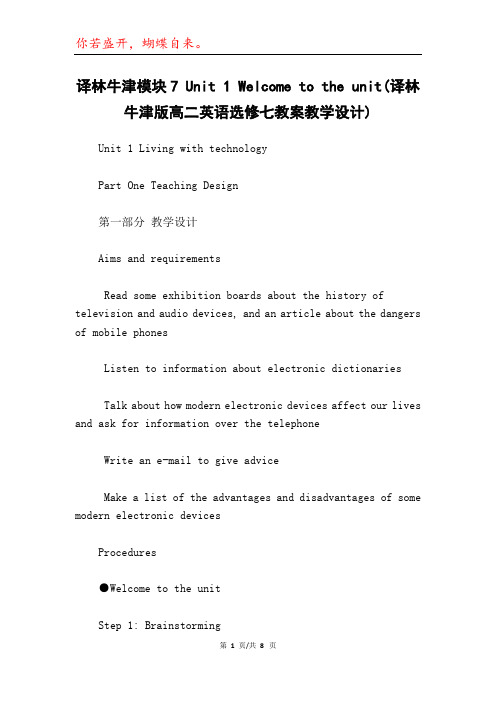
译林牛津模块7 Unit 1 Welcome to the unit(译林牛津版高二英语选修七教案教学设计)Unit 1 Living with technologyPart One Teaching Design第一部分教学设计Aims and requirementsRead some exhibition boards about the history of television and audio devices, and an article about the dangers of mobile phonesListen to information about electronic dictionariesTalk about how modern electronic devices affect our lives and ask for information over the telephoneWrite an e-mail to give adviceMake a list of the advantages and disadvantages of some modern electronic devicesProcedures●Welcome to the unitStep 1: BrainstormingNowadays, it seems that man cannot live without such electrical and electronic products as microwave ovens, refrigerators, TV sets, air conditioners, washing machines, electric fans, mobile phones, digital cameras and vacuum cleaners. Do you agree with me?Which do you think is the most useful?What electrical and electronic products do you use in your studies and in your life? (electronic dictionaries, computers, CD players, MP3)Are they helpful or just make you lazier?For referenceElectronic dictionaries give students quick responses in their reading. Students using electronic dictionaries need less time in reading than those who use paper dictionaries. Moreover, electronic dictionaries can provide correct pronunciation to students, which a paper dictionary cannot. The number of people using electronic dictionaries is increasing greatly.As we can see, with the rapid development of electronic technology in the last few decades, electrical and electronic products have made ou r lives more convenient. I’d like to give you some examples.Now, let’s have a discussion: What do you think life wouldbe like without these products?Step 2: Sharing information1. Let’s enjoy some wonderful ads about some electrical and electronic products. What conclusion can you draw?Man has made remarkable progress in this area in the last few decades.Do you think the progress has made our lives more convenient or has made simple things more complicated?For reference●They are invented to meet people’s needs.●They have improved people’s lives to some degree.●They are developing very quickly.●The radiation from some of the electrical and electronic devices, such as mobile phones, may be h armful to people’s health.●When people buy new electrical of electronic devices, they throw away the old ones. This may generate large amount of waste, which is harmful to the environment.2.Group work. Look at the four pictures at page 1. Let’s study them one by one and try to discuss some questions in groupPicture 1What kind of TV do you have at home?What differences can you find between the TV in your home and the TV in this picture? (Early TV had antennae on top. The screen was very small and could show only black-and-white pictures. The size of the TV was small compared with modern TV, and usually it looked like a wooden box. Early TV also did not have a remote control. The control panel was on one side of the screen.)What kind of pictures did early TV have? (Early TV had black-and-white pictures that were fuzzy.)What other functions do you need in a modern TV?Picture 2What did people need when they wanted to record music in the past? (Tapes and a tape recorder.)How did people record music in the past? (People put the tapes into the recorder, then played the tape with music at one side and pushed the play and record buttons at the other side to record the music onto the blank tape.)Look at the picture. What devices do people need to record music now? (A computer, an MP3 player and some recordingHow do People record music using a computer? (People copy the music from a CD to the computer using recording software. The music will then be digitalized in and played by an MP Player. )Picture 3How do you look up a word in a paper dictionary? (The words in a paper dictionary are arranged in alphabetical order from ‘A’ to ‘Z’. We need to look at the f irst letter of the word and use it to search in the dictionary. If two words start with the same letter, we look at the second letter to decide the alphabetical order. If the first and second letters are the same, we look at the third letter and so on.)How many of you have an electronic dictionary? How do you look up a word in such a dictionary? (We key in the word we want to look up and click the button ‘Enter’. Then the word entry will appear on the screen.)Besides the dictionary, what else can be stored in your electronic dictionary? (There can be a calendar, a list of addresses and phone numbers, memos or a clock. More recent electronic dictionaries have large memory space and some can be used as electronic books with hundreds of books stored inside.)Which do you prefer, an electronic book or a traditional paper book? Why?Picture 4How did people keep in touch in the past? (People sent letters in the past, but letters were slow, and they took from a few days to several months to arrive. Then people invented the telegraph, but the telegraph could send only short sentences. Later, people could communicate via telephone, but the disadvantage was that not everyone had a telephone. Now, people use e-mails to communicate. E-mails are quick, but people without computers and access to the Internet cannot send e-mails. Today, most people use mobile phones to keep in touch with others. The size of a mobile phone is small so people can carry one in a pocket and receive and make calls wherever they are and whenever it is.)What recent developments have been made to mobile phones? (Now, mobile phones have more and more functions. They can send text messages. They can also be used as a digital camera to take still or even moving pictures. People can send the pictures they take to other mobile phones or e-mail addresses. Mobile phones can be connected to the Internet and people can look at web pages with mobile phones. More technologically advanced mobile phones can receive TV signals so that people can watch live TV programmes on their mobile phones.)It is reported that many high school students bring mobile phones to their schools. Do you think high school students should use mobile phones at school? Why or why not?Please express your ideas freely and make sure that all ofyou have a chance to speak.Step 3: Discussion:1. How have different electronic devices changed over time?2. How have these inventions improved people’s lives?Sample answers1. Different electrical and electronic devices have changed a lot over time. Take mobile phones as an example. Mobile phones first appeared in 1947, and they looked much bigger than what we are using nowadays. In the past, they could only provide us with basic services like making phone calls. However, customers now want to be entertained. As a result, developments were made. Nowadays, many new types of phones are available that can connect to the Internet or be used as cameras or MP3 players.2. These inventions have greatly improved people’s lives. Mobile phones are a good example of this. Before mobile phones came into use, people couldn’t make phone calls or receive phone calls if there was no telephone nearby. With mobile phones, people are able to make calls at any time and at any place. Today, many of us are very busy and cannot be expected to wait for a long time. Mobile phones provide us with a chance to keep in touch with others wherever we are.For referenceElectrical and electronic goods help people save a lot of time and make our lives more convenient. However, we cannot ignore that every year electronic and electrical waste is increasing considerably, much of which will do great harm to our environment if not properly dealt with. The governments in many countries have realized the importance of solving the problem and they have been trying to find the solutions, but further attention needs to be given to the problem.Step 4: Homework:1. Collect more information about the development of some electronic and electrical devices.2. Prepare the Reading part.文档内容到此结束,欢迎大家下载、修改、丰富并分享给更多有需要的人。
- 1、下载文档前请自行甄别文档内容的完整性,平台不提供额外的编辑、内容补充、找答案等附加服务。
- 2、"仅部分预览"的文档,不可在线预览部分如存在完整性等问题,可反馈申请退款(可完整预览的文档不适用该条件!)。
- 3、如文档侵犯您的权益,请联系客服反馈,我们会尽快为您处理(人工客服工作时间:9:00-18:30)。
M7U1语法复习导学案一、探究发现①Regular public broadcasting followed shortly afterwards.②Many different people contributed to the development of TV.③I regret to tell you that your application has been turned down.④On my birthday she gave me a mobile phone as a gift.⑤It was not until the early 1950s that most tape recorders began using plastic tape.⑥Who can foresee what the future will bring?⑦The first public TV broadcasts were made in the USA.⑧However, most people still benefit from satellite TV.[我的发现](1)以上各句中的黑体部分,属于及物动词的有___________,属于不及物动词的有_______。
(2)从以上句子可以看出,及物动词可接______、代词、_______、从句、_________作宾语。
(3)由⑦句可以看出,及物动词能使用_________语态。
(4)由②⑧句可以看出,不及物动词不能直接接_________;必要时,则需加________。
二、知识梳理(一)及物动词及物动词是指后面可直接跟宾语,并且必须跟宾语才能使其意义完整的动词。
大部分及物动词有被动语态。
及物动词常用于以下三种结构中:1.“主语+谓语+宾语”结构此时的宾语可以是一个名词、代词、动词不定式(短语)、疑问词+动词不定式、动名词(短语)或者从句。
He charged the battery.(名词)Eventually, his behavior satisfied her.(代词)I want to get your help. (动词不定式短语)I don't know what to do. (疑问句+动词不定式)He delayed telling her the news. (动名词短语)No one can foresee what will happen in the future. (宾语从句)(1)下面这些及物动词后只能接动名词作宾语:admit(承认),appreciate(感激), avoid, consider(考虑), delay, deny, enjoy, escape, prevent, fancy(想象), finish, imagine, mind, miss(想念), postpone(推迟), practise, recall(回忆), resist, risk, suggest(建议), include, stand(忍受), forgive, keep(继续)等。
Would you mind using your phone?用一下你的电话你介意吗?That young guy still denies having started the fire behind the store.那个年轻人仍然否认在商店后面放了火。
(2)下面这些及物动词后只能接不定式作宾语:afford, arrange, ask, choose, decide, determine, expect, hesitate, hope, long(渴望), manage, offer, plan, prepare, pretend, promise, refuse, threat, wish等。
Can you afford to lend me some money?你能借一些钱给我吗?He has determined to learn French.他已决定学法语了。
(3)可接不定式/动名词作宾语且意义差别大的及物动词。
⎩⎪⎨⎪⎧ forget to do sth. 忘记要做某事forget doing sth. 忘记做过某事 ⎩⎪⎨⎪⎧ remember to do sth. 记得要做某事remember doing sth. 记得做过某事 ⎩⎪⎨⎪⎧ attempt to do sth. 试图做某事attempt doing sth. 试着做某事 ⎩⎪⎨⎪⎧ mean to do sth. 打算做某事mean doing sth. 意味着做某事 ⎩⎪⎨⎪⎧try to do sth. 努力做某事try doing sth. 尝试做某事 (4)接不定式或动名词作宾语且意义差别不大的及物动词。
a .表示“爱、憎、喜、恶”的情感类动词hate, love, like, prefer 等后接不定式或动名词作宾语时,意义虽相同,内涵却有些区别——接不定式作宾语时,一般表示一次性的、具体的动作;接动名词作宾语时,一般表示习惯性的、一般性的动作。
They prefer staying indoors when it is cold.天冷时他们喜欢待在屋里。
Would you prefer to stay at home this evening with your brother?今晚你想和你弟弟一起待在家里吗?b .begin, start, continue 等少数几个动词后接动名词或不定式作宾语时意义差别不大。
Tom began learning/to learn how to use a computer.汤姆开始学习如何使用电脑。
[即时演练1](1)用所给词的适当形式填空①Don't forget ________ (send) my regards to your parents!②Don't hesitate any more. Why not try _________ (walk) this way?③I still remember ___________ (take) to Beijing for the first time.④—Look! The light is on!—But I remember_________ (turn) it off!(2)完成句子①你怎么这么快就完成作业了?How did you_____________________________ so soon?②他们正在练习唱那首新歌。
They are ___________________________ the new song.③他前天到达巴黎。
He_____________________the day before yesterday.④我不知道我该怎么办。
I don't________________________.⑤上周一个网球砸在了我的头上,但是我尽力去忽视疼痛,认为迟早会消失的。
(浙江高考改编)Last week a tennis ball hit me on the head, but I tried_________________, believing that it would go away sooner or later.2.“主语+谓语+双宾语”结构(1)该结构中的谓语动词必须跟两个宾语才能表达完整的意思。
一个是表示人的间接宾语,一个是表示物的直接宾语。
间接宾语一般在前面,直接宾语在后面。
Tom sent Mary a text message.汤姆给玛丽发了一条短信。
(2)有时直接宾语和间接宾语可以位置对调,此时间接宾语前应加上介词to或for。
主语+及物动词+物(直接宾语)+to+人(间接宾语)。
如:A man was distributing leaflets to the passersby.主语+及物动词+物(直接宾语)+for+人(间接宾语)。
如:The woman bought an elegant dress for her daughter.[名师点津]间接宾语前常用to的动词有give, tell, lend, sell, teach, send, write, show, bring, pass, offer, hand, distribute等。
间接宾语前加介词for的动词有buy, choose, get, make, order, sing, do, save等。
3.“主语+谓语+复合宾语”结构该结构中的动词虽然是及物动词,但是只跟宾语还不能表达完整的意思,必须加上一个补充成分,才能表达一个完整的意思。
We elected Li Yang our monitor. (Li Yang is our monitor.)The news made us sad. (We were sad.)能充当宾语补足语的有名词、形容词、介词短语、动词不定式(短语)、分词等,用来补充说明宾语。
如:He appointed John marketing manager. (名词)The manufacturers made the computers portable. (形容词)I found myself in darkness. (介词短语)The state government encouraged voters to vote. (动词不定式)Don't leave the water running after you have washed your hands. (现在分词)(1)非谓语形式作宾语补足语时,只能用现在分词作宾语补足语的动词有catch, keep, start 等。
She caught her son smoking a cigarette.她撞见她的儿子吸烟。
His words started me thinking.他的话使我陷入思考。
(2)非谓语形式作宾语补足语时,跟带to的不定式作宾补的及物动词有allow, ask, tell, want, wish, like, hate等;跟不带to的不定式作宾补的有感官动词和使役动词或短语let, feel, notice, help, make, have, listen to, hear, see, watch, look at, observe等。
His parents don't allow him to stay out late.他父母不允许他在外面待到很晚。
